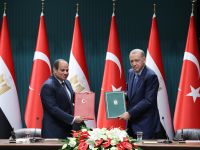Finding my family in Yarmouk - then losing them again
Those who do not have family members in Syria’s refugee camps can watch the atrocities taking place on the news from far away, as if it were all just one big Hollywood horror movie: one that causes deep anguish for just a few hours. But those who do have family and friends living on Haifa Street—the main road in Damascus’ Yarmouk refugee camp—or those who receive a photo of a body that looks an awful lot like an acquaintance of yours, the news coming out of Syria leaves a deep, psychological scar that is nearly impossible to deal with.
My parents, who were born when the State of Israel was founded, raised us on the backdrop of a story of refugees, the expulsion of the Palestinian people and the remains of a Galilee village that stand like a monument. Without photos, names or the residents themselves. We knew that most of our family is over there in Syria and Lebanon, and that we are here.
Source: +972 Mag
Technology booms where the Arab Spring raged
In 2011, the Internet brought us reports about revolutions breaking out around the Middle East and North Africa (MENA). People in Tunisia, Egypt, Yemen, Syria, Libya, and Bahrain rose up separately yet together in collective protests that became part of what some inside and outside the region called the “Arab Spring.”
At the time, the Internet gave voice to hundreds of thousands of people demanding change. It continues to serve as a platform to broadcast the personal stories of individuals around the Middle East dealing with changing governments, continued violence, war, and peace. In these ways, the online world has kept both participants and viewers connected to the very real events occurring in the region as they continue to unfold.
Source: Muftah
Morocco divided over relationship with Egypt's Sisi
The recent official meeting between the Egyptian head of state Abdel Fattah Sisi, who toppled the first ever democratically elected Egyptian government, and Abdelilah Benkirane, the head of the first ever democratically elected Moroccan government, on the sidelines of the 25th edition of the Arab Summit, sparked a lot of debate in the North African kingdom. This was largely due to the Islamic reference Benkirane’s Justice and Development Party (PJD) embraces, the PJD’s history of clinching its teeth at any reference to Sisi's Egypt, and the dozen demonstrations the youth section of the PJD held in various Moroccan cities to denounce the putsch and call for restoring the legitimate Egyptian government.
Source: Your Middle East







